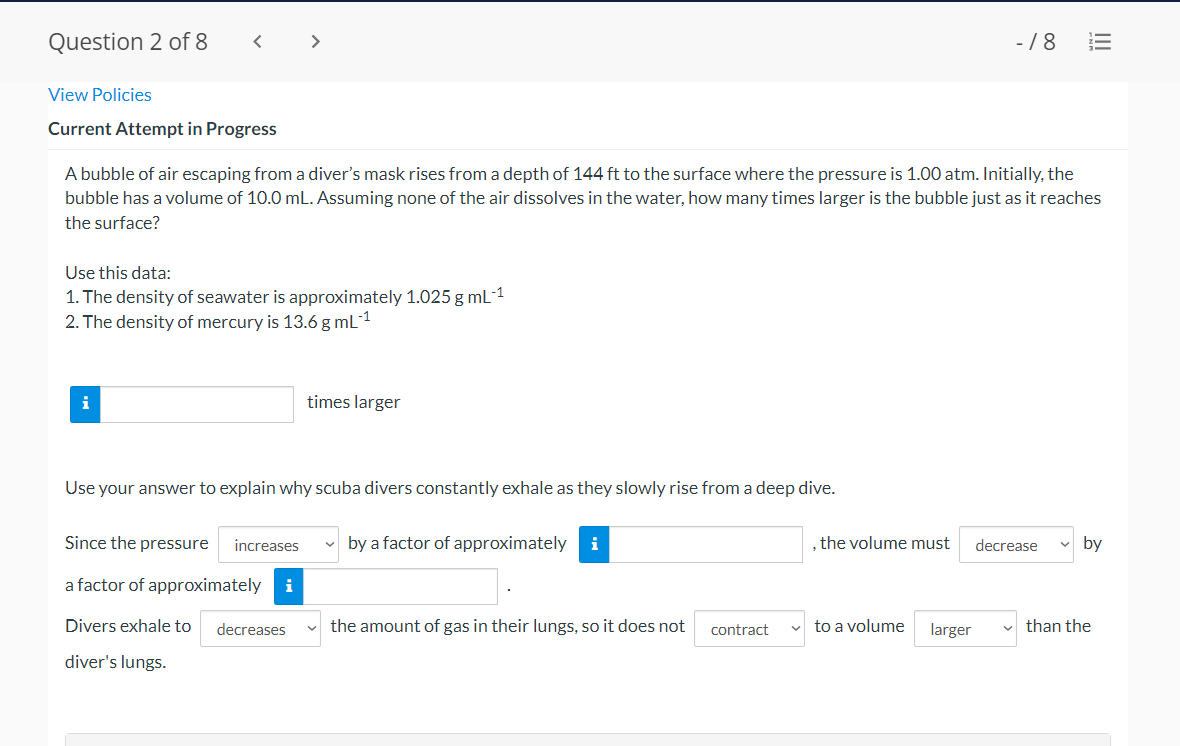A bubble of air escaping from a diver's mask rises from a depth of 144 ft to the surface where the pressure is 1.00 atm. Initially, the bubble has a volume of 10.0 mL. Assuming none of the air dissolves in the water, how many times larger is the bubble just as it reaches the surface? Use this data: 1. The density of seawater is approximately 1.025 g mL-1 2. The density of mercury is 13.6 g mL1
A bubble of air escaping from a diver's mask rises from a depth of 144 ft to the surface where the pressure is 1.00 atm. Initially, the bubble has a volume of 10.0 mL. Assuming none of the air dissolves in the water, how many times larger is the bubble just as it reaches the surface? Use this data: 1. The density of seawater is approximately 1.025 g mL-1 2. The density of mercury is 13.6 g mL1
Chemistry: An Atoms First Approach
2nd Edition
ISBN:9781305079243
Author:Steven S. Zumdahl, Susan A. Zumdahl
Publisher:Steven S. Zumdahl, Susan A. Zumdahl
Chapter8: Gases
Section: Chapter Questions
Problem 27Q
Related questions
Question

Transcribed Image Text:Question 2 of 8
>
-/8
View Policies
Current Attempt in Progress
A bubble of air escaping from a diver's mask rises from a depth of 144 ft to the surface where the pressure is 1.00 atm. Initially, the
bubble has a volume of 10.0 mL. Assuming none of the air dissolves in the water, how many times larger is the bubble just as it reaches
the surface?
Use this data:
1. The density of seawater is approximately 1.025 g mL 1
2. The density of mercury is 13.6 g mL1
i
times larger
Use your answer to explain why scuba divers constantly exhale as they slowly rise from a deep dive.
Since the pressure
v by a factor of approximately i
, the volume must
decrease
by
increases
a factor of approximately
i
Divers exhale to
decreases
the amount of gas in their lungs, so it does not
contract
to a volume
larger
than the
diver's lungs.
Expert Solution
This question has been solved!
Explore an expertly crafted, step-by-step solution for a thorough understanding of key concepts.
Step by step
Solved in 2 steps with 2 images

Knowledge Booster
Learn more about
Need a deep-dive on the concept behind this application? Look no further. Learn more about this topic, chemistry and related others by exploring similar questions and additional content below.Recommended textbooks for you

Chemistry: An Atoms First Approach
Chemistry
ISBN:
9781305079243
Author:
Steven S. Zumdahl, Susan A. Zumdahl
Publisher:
Cengage Learning


Chemistry
Chemistry
ISBN:
9781305957404
Author:
Steven S. Zumdahl, Susan A. Zumdahl, Donald J. DeCoste
Publisher:
Cengage Learning

Chemistry: An Atoms First Approach
Chemistry
ISBN:
9781305079243
Author:
Steven S. Zumdahl, Susan A. Zumdahl
Publisher:
Cengage Learning


Chemistry
Chemistry
ISBN:
9781305957404
Author:
Steven S. Zumdahl, Susan A. Zumdahl, Donald J. DeCoste
Publisher:
Cengage Learning

Introduction to General, Organic and Biochemistry
Chemistry
ISBN:
9781285869759
Author:
Frederick A. Bettelheim, William H. Brown, Mary K. Campbell, Shawn O. Farrell, Omar Torres
Publisher:
Cengage Learning

Chemistry for Engineering Students
Chemistry
ISBN:
9781337398909
Author:
Lawrence S. Brown, Tom Holme
Publisher:
Cengage Learning

General Chemistry - Standalone book (MindTap Cour…
Chemistry
ISBN:
9781305580343
Author:
Steven D. Gammon, Ebbing, Darrell Ebbing, Steven D., Darrell; Gammon, Darrell Ebbing; Steven D. Gammon, Darrell D.; Gammon, Ebbing; Steven D. Gammon; Darrell
Publisher:
Cengage Learning